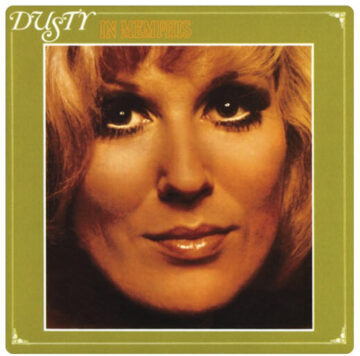
Dusty Springfield was one of the most unfortunate persons ever to be famous. She was gay and/or bi-sexual when it wasn‘t fashionable to be, and she made several disastrous career choices that have diminished her legacy. She suffered from stage fright, fan fright, and microphone fright. In spite of making half a dozen of the most gorgeous and moving pop recordings ever, she felt inadequate. She spent her life wound up as tightly as a spring ready to snap, as self-absorbed as Phil Ochs who did self-destruct, as lonely as Tim Hardin who wasted his talent and his immeasurable gift, and as close to the line as Chet Baker or Janis Joplin. That she lived to be fifty-seven and died of cancer on March 2, 1999 is a miracle, since her lifestyle and personal complications were on a collision course with death long before she reached forty. However, it‘s easy to forget all that when you listen to her sing. She had The Cry alright, and it could move you in unexpected ways.
She was in love with American soul music and her sultry, creamy voice was ideally suited to that style of music. At her funeral Elton John said she was “the greatest white singer that ever has been.” So what went wrong?
Dusty was chronically unlucky with her choice of songs and her choice of producers. Time after time she was either let down or she let herself down by singing the wrong material. That‘s why even her Greatest Hits album tends to be uneven. There are half a dozen spectacular songs and a dozen or so average numbers that scarcely belong in anyone‘s repertoire. She was over-produced so much of the time because she had a powerful voice that could easily shine in front of big productions. However, she did her best work with intimate songs, where she seemed to singing at half-voice and still managed to project to the core of the listener. I‘ll give you two examples of this:
“What Are You Doing The Rest of Your Life?” is a song from 1969 composed by Michel Legrand working with the husband and wife team of Marilyn and Alan Bergman, and has been recorded by Sarah Vaughn, Frank Sinatra, Rosemary Clooney, Barbra Streisand and many others. Dusty almost whispers the song but projects such sincerity and a compelling depth of feeling unattainable by most pop singers.
“Son Of A Preacher Man” from the album Dusty In Memphis is her greatest achievement, although it was notoriously the most difficult to wrest from her. Her career had suffered after her early big hits such as “I Only Want To Be With You”, and “Wishing and Hoping”. Part of this was due to the Beatles and their move away from hit singles towards more complex material. It‘s easy to forget that The Beatles dominated almost every aspect of Sixties music, so much so that they destroyed many a great musical career. Roy Orbison was one of the few to survive the British onslaught, and even though Dusty was herself British, there was a perception that her style of music, geared to the short single, had become outdated. Dusty left her record company and joined Atlantic Records because of their commitment to soul music, and Atlantic set her up in a recording session in their Memphis studios. She walked into the session to find many of her heroes there and she was so intimidated by them that she didn‘t record a single vocal track. The producer, Jerry Wexler, said Dusty had a massive inferiority complex.
Dusty retreated to New York to a hotel room, where she listened to the session tapes over and over again. Finally she got up the courage to lay down the vocals in a New York studio, wearing headphones with the instrumental tracks blasting into her ears at inhuman volumes. She finished the tracks and didn‘t like them at all. It was only when the album started selling well and getting great reviews that she came to realize she had accomplished something magnificent.
The Memphis horns, the superb backup singers, and Dusty‘s heartfelt approach turned “Son of a Preacher Man” into the first hit she‘d had for a couple of years. It would prove to the last major impact she made on the charts. She had a brief lift to her career and then stumbled into alcohol, drugs, and a potent but challenging relationship with the Canadian rock singer Carol Pope. Dusty never regained her moment of greatness she experienced with that Memphis record. Perhaps she never knew, or was reluctant to accept, just how good she was.




The 8 alternative tracks (original/mono) are much, much better than the ones put on the original l.p. If those had been published, the L.P. might have been a great hit. Wexler et Al shot themselves in the collective foot.